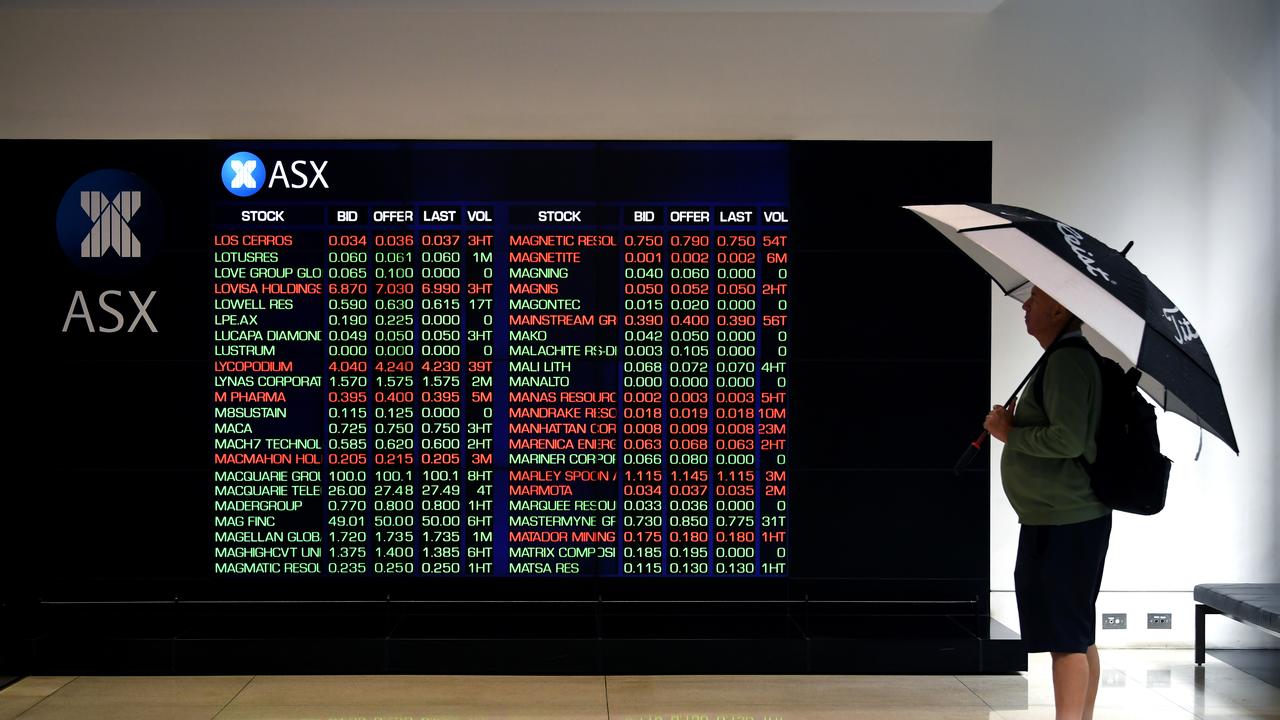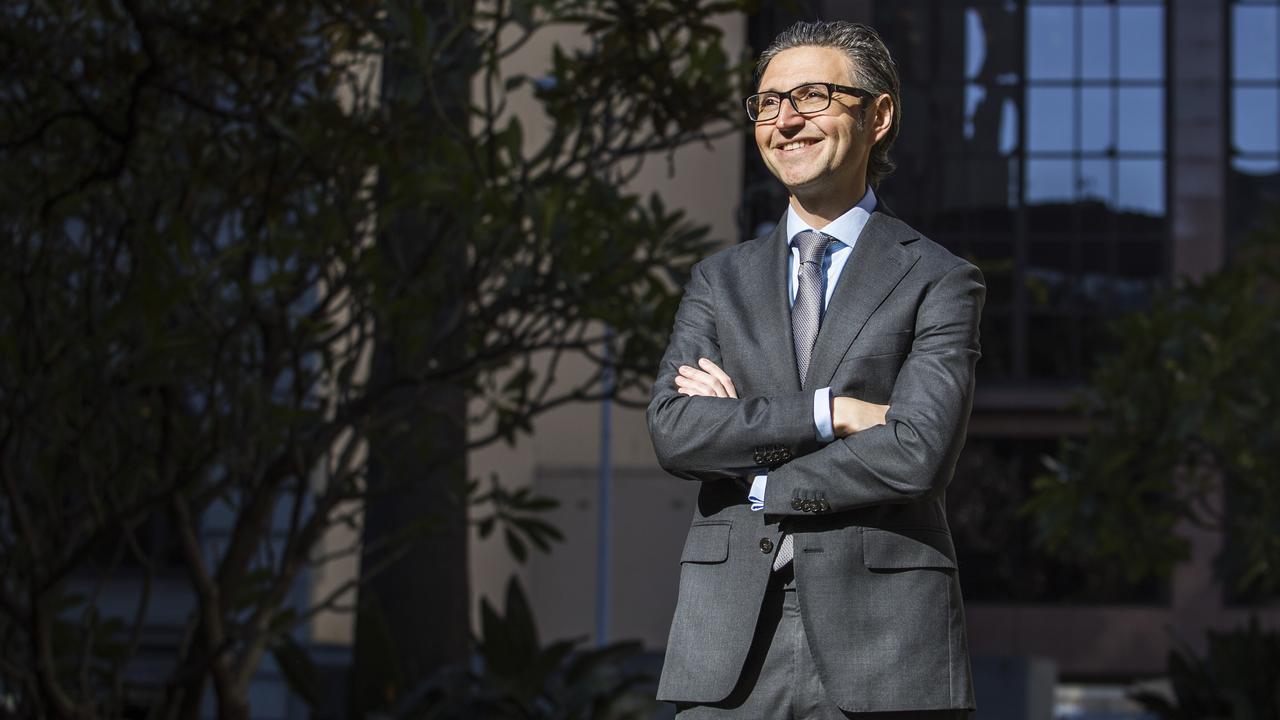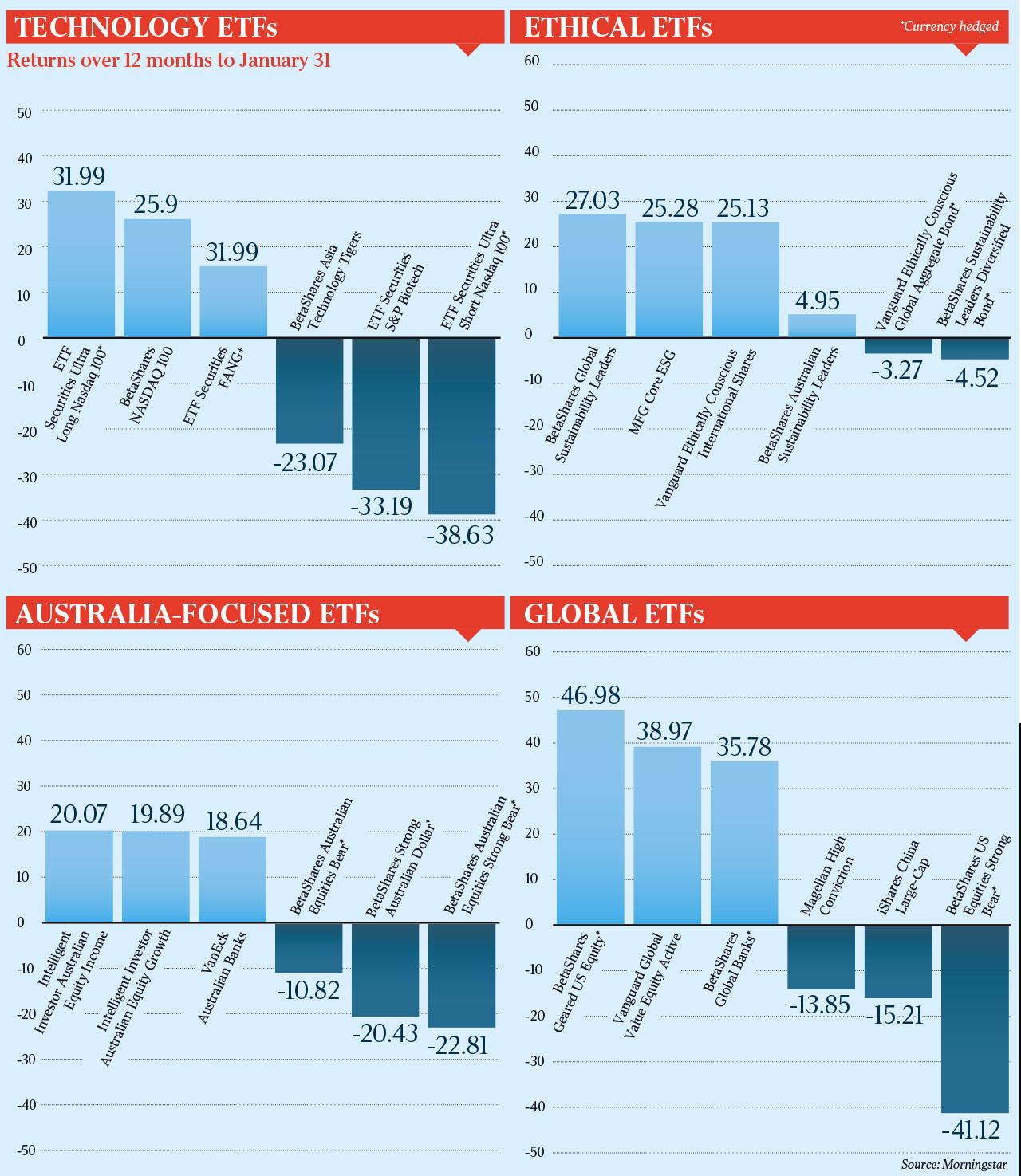Exchange-traded funds take some of the guesswork out of picking winners
Exchange-traded funds topped $US10 trillion in assets globally at the end of 2021, but not all are created equal.

Exchange-traded funds reached a new milestone at the end of 2021, topping $US10 trillion in assets globally. But with markets now in flux, fund managers are sounding the alarm that passive investing won’t cut it this year. ETF providers and financial advisers aren’t convinced.
“Every market is the stockpicker’s market. It doesn’t matter whether stocks are going up, down or sideways, the promise of outperformance is always there,” BetaShares CEO Alex Vynokur says.
“The problem is the statistics tell us the actual delivery has been falling significantly short of the promise, over one, three, five, 10 and 15 years. So I think the reality is that smart investors will distinguish between a fund manager’s pitch and reality.”
According to Arian Neiron, managing director and head of Asia Pacific for VanEck, one of the world’s biggest asset managers, ETFs shine in times of volatility.
“Every time there’s a volatile period in markets, ETFs show their strength. In March 2020, with the Covid market capitulation you had price discovery and they performed as they should,” Mr Neiron told The Australian.
“It’s the active asset managers that are not well positioned. There are active managers in the last month alone who have significantly underperformed the ASX 200 or the MSCI World Ex Australia for international equities.”
Mixed returns
Certainly, some ETFs have shone through the pandemic. Over the 12 months to January 31, BetaShares’ crude oil ETF (ticker OOO) returned 73 per cent, according to research house Morningstar.
Other top performers include BetaShares’ geared US equity fund (GGUS), with a 47 per cent return, Vanguard’s global value equity active ETF (QUS), with a 35 per cent return, and iShares S&P 500 ETF, which returned 34 per cent.
Other ETFs haven’t fared as well. If you were invested in BetaShares’ US Equities Strong Bear Hedge Fund (BBUS) for the past 12 months, you would be sitting on a -41 per cent return. The second-worst performance came from the ETFS Ultra Short Nasdaq 100 Hedge Fund, which returned -39 per cent over the 12 months to the end of January.
Passive ETFs, where the investment tracks an index, make up the bulk of the booming industry. But as floods of funds have flowed into these cheap, easy-access investments, active managers have had to reset, with some launching their own active ETFs to tap into the lucrative market. Success has been mixed, at best. While two of Vanguard’s active ETFs were in the top 20 returns on a one-year basis, including the Vanguard Global Value Equity Active ETF, which returned 39 per cent, beleaguered fund manager Magellan returned just 16.8 per cent on its global active ETF over the 12 months to January 31, in a year where the benchmark returned 27 per cent. Its high-conviction ETF, meanwhile, returned minus-14 per cent, while the Magellan Core ESG ETF returned 25 per cent.
All up, 16 of the 250-odd ETFs in Morningstar Australia’s universe returned more than 30 per cent over the year, most of which were passive investments.
In comparison, some of the nation’s best-known stockpickers had a pretty average year. Platinum’s flagship international fund returned just 13.5 per cent over the 12 months to the end of January.
Elsewhere, Magellan’s High Conviction Fund was sitting on a 12 per cent return over the same period – and that’s before the Meta sell-off that hit in recent days. The fund holds just a handful of what it says are the world’s best companies, including Meta, which lost 30 per cent earlier this month.

Active management
ETF investing in Australia, like elsewhere, has grown at a frantic pace over the past few years: after more than 50 per cent growth over 2019 and 2020, the industry surged a further 45 per cent over 2021 and now commands more than $130bn in assets under management in the local market, according to the latest BetaShares/Investment Trends ETF Report.
Over January, investors pumped $1.4bn into the Australian ETF industry, with BetaShares getting the lion’s share, at $717.8m, followed by Vanguard’s $652.9m and VanEck’s on $114.8m, according to data from the ASX and Cboe Australia. More than 1.7 million Australians were invested in ETFs by the end of 2021, up 33 per cent on the year prior, the BetaShares report found.
Globally, the industry tipped over the $US10 trillion mark in December following a surge of inflows over the past year. At that point, equities were enjoying a strong finish to 2021.
Since then, sharemarkets have faltered as talk of rate hikes dominates. The S&P/ASX200 is down 5 per cent since the start of the year, in the US the tech-heavy Nasdaq has corrected 13 per cent, the S&P 500 is down 8 per cent and 5 per cent has been shaved off the Dow Jones Industrial Average.
In an environment of rising inflation and looming rate hikes, fund managers see a chance to prove their worth.
“It’s ironic, since so many have gone passive, that this could be the year of active management,” Bell Asset Management chief investment officer Ned Bell said.
“We’re actually very optimistic. We feel these periods of volatility play really well for us, and I think the next two years are going to be a great period for active funds management more generally,” he predicted.
Right now he’s telling anyone who will listen that they should be switching from large cap growth and emerging markets into quality small-mid caps on the basis they are uncorrelated, with less valuation and a better earnings trajectory than mega-cap tech.
Future Fund chief executive Raphael Arndt earlier this month warned of the challenging investing outlook and the need to move to more active strategies, predicting the returns of the last decade “won’t be there” going forward.
“The return you get for just having capital and holding assets is going to be less going forward because we’ve got headwinds in terms of lower economic growth and rising interest rates.
“Things like ETFs, index positions, bond positions, reward you for having capital and being willing to take risk, but broadly that‘s all they do,” he said.
The Future Fund would “absolutely” access investments through investment managers, Dr Arndt added. “For us, that’s going to be primarily through private equity infrastructure property. For the household investor, they need to think about their options,” he said, as he acknowledged the cost of some of those investments.
If very recent flow trends are anything to go by, this year could indeed mark a shift in the active/passive debate, according to Bank of America.
BofA client ETF inflows over the first week of February were elevated versus a typical week but lower than the week prior, the bank said. On an annualised basis, flows for the year to date suggest the smallest ETF inflows since 2013 and the smallest single stock outflows in the bank’s post-crisis history, BofA added.
“While still early, we watch for any persistence of single stock buying (and any continued deceleration in passive inflows) that could support our view that way may be closer to a tipping point in the AUM shift from active to passive,” the bank said.
Winners and losers
But financial adviser Chris Brycki, who runs online investment adviser Stockspot, says investors should look through the noise and stick with ETFs.
“The sales pitch of most active fund managers is ‘we help avoid the losers’. But actually what‘s way more important as an investor is that you are guaranteed to own the winners, because the winners are what drives all the market returns,” he said.
“As an index investor, you accept that you‘re going to own some losers, but you know you’ll also own the winners, which benefits you in the long run.”
Rather predicting future market moves, Mr Brycki tells clients to diversify to spread the risk. His firm, which manages $600m for 11,000 clients, invests in a handful of ETFs: a global 100 shares ETF, an emerging markets ETF, an Australian shares ETF, a bond ETF and a physical gold ETF.
“We think it‘s all you need to get great diversification with a broad range of different assets and stocks,” he said, as he outlined the growth prospects for the ETF industry,” he said.
“I‘ve always viewed it as a secular trend rather than a cyclical trend. Competition in our industry is so high now that active investing just doesn’t work for most people. “There’s going to be a probably a 30- or 40-year trend out of active investing into index investing until index investing is so large that active investors can start to earn a crust again. And we are still a long, long way away from that.”

Originally published as Exchange-traded funds take some of the guesswork out of picking winners





